Lifting the American Embargo against Cuba
‘I Am a Catholic Without a Pope’
MIAMI (AP) - Dec. 21, 2014 - The key role Pope Francis played encouraging talks between Presidents Barack Obama and Raul Castro left fractures among his flock in South Florida, where many older Roman Catholics equate the Castro brothers with the devil.
Many Catholics worldwide have expressed pride in seeing Francis stirring hopes of progress in communist Cuba, but some Cuban-Americans say their spiritual leader betrayed them. “I’m still Catholic till the day I die,” said Efrain Rivas, a 53-year-old maintenance man in Miami who was a political prisoner in Cuba for 16 years. “But I am a Catholic without a pope.”
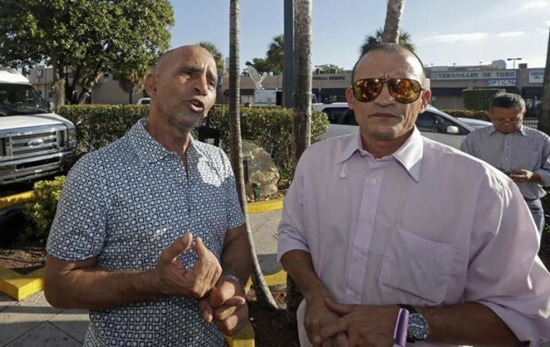
In this photo taken Thursday, Dec. 18, 2014, anti-Castro protesters and former Cuban political prisoners Efrain Rivas, left, and Arturo Suarez, right, talk to a reporter in the Little Havana area of Miami. Rivas and Suarez expressed their disagreement on Wednesday’s announcement that the U.S. and Cuba will begin taking steps to restore full diplomatic relations, marking the most significant shift in U.S. policy toward the communist island in more than half a century. (AP Photo/Alan Diaz)
Miami Archbishop Thomas Wenski acknowledged that some Catholics are “concerned or suspicious,” but said many more exiles welcome the breakthrough, despite their suffering.
“The pain is real, but you can’t build a future on top of resentments,” Wenski told The Associated Press in an interview.
The Vatican has been reaching out to Cuba at least since Pope John Paul II, who declared during his historic 1998 visit to the island, “May Cuba, with all its magnificent potential, open itself up to the world, and may the world open itself up to Cuba.” Discussions continued under Pope Benedict XVI, who visited Cuba in 2012.
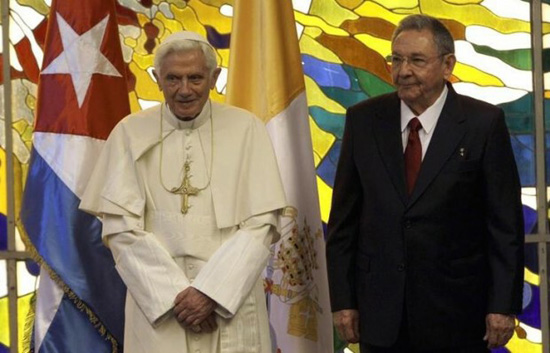
In this file photo taken in Havana on March 27, 2012, Cuba’s President Raul Castro, right, and Pope Benedict XVI attend a meeting. Pope Francis rightly got credit for helping bring the U.S. and Cuba together and free U.S. government subcontractor Alan Gross. But it was actually Francis’ predecessor, Emeritus Benedict XVI, who made the first high-level Vatican manoeuver to release Gross, spurred in part by an unlikely group of papal lobbyists. (AP Photo/Ismael Francisco, Cubadebate)
Cuban Cardinal Jaime Ortega, who is close to Francis, set up the papal visits and has been decisive in improving ties between the church and the officially atheist state since becoming Havana archbishop in 1981. This frustrates some older Catholics who wanted the church to use its unique position inside Cuba to take a harder line.
“The church is contaminated,” said Miguel Saavedra, a 57-year-old Miami mechanic who leads an anti-Castro group and wears a gold cross as a sign of his Catholic faith.
Exiles incensed by the diplomacy openly wonder: Was Francis strong-armed by President Barack Obama? Does he understand how terrible the Castro brothers are? Was he perhaps making a foolhardy bid to cement his change-making image?
“I don’t know what the pope was thinking,” said Jose Sanchez-Gronlier, a 53-year-old lawyer who said he was persecuted for his faith until leaving Cuba as a teenager, and will never forget watching the government seize a convent near his childhood home. “I see a certain naivete in the pope,” he said.
Sen. Marco Rubio, a Cuban-American from Florida who has led the Republicans’ criticism of Obama’s executive actions on Cuba, also took a swipe at the pope, telling reporters in Washington that he would “ask His Holiness to take up the cause of freedom and democracy.”
All this is familiar territory for Francis, who has spent a lifetime navigating the after-effects of the Cold War in Latin America. In his writings before becoming pope, the Argentine church leader criticized Cuban state authoritarianism as well as the U.S. embargo, and called on both sides to talk out their differences. As pope, he wrote to both Obama and Castro suggesting that a thaw could begin by releasing prisoners.
But Arturo Suarez-Ramos, a 50-year-old Miami waiter who was a political prisoner in Cuba for 27 years, said Francis is reaching for more headlines after insisting that homosexuals and divorced people are welcome in church.
“He’s trying to get a legacy at any price,” Suarez-Ramos said.
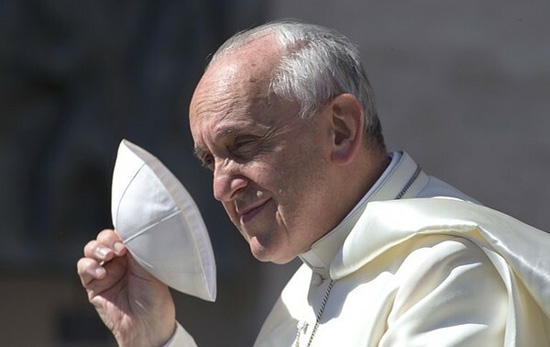
Pope Francis holds his skullcap as he arrives in St. Peter’s square at the Vatican for his weekly general audience, Wednesday, June 12, 2013. (AP Photo/Alessandra Tarantino)
Jay Fernandez, a retiree who left Cuba in 1961, said Francis acted like a beggar, taking whatever scraps of concessions the Cuban government offered.
“He wants to be everywhere, he wants to be liked by everyone,” Fernandez said. “That’s his job to be a peace guy, but it doesn’t accomplish a damn thing, especially in Cuba.”
U.S. bishops also have long called for an end to the embargo and for improved relations with Cuba. Engagement can do more than isolation to open up Cuban society and improve human rights and religious liberty, they said.
That message seemed to connect with some attending midday Mass at Ermita de la Caridad, a church dedicated to Cuba’s patron saint.
“This is the best thing that could have happened,” said Lucresia Leon, 70, who left Cuba during the 1980 Mariel boatlift, when 125,000 fled the island. She smiled widely, saying “Everything will be fixed.”
Draped in the bright purple vestments of Advent, the Rev. Juan Rumin Dominguez, who arrived from Cuba nine years ago, said accepting change is not a simple thing. “It’s not easy, but the faithful people in these kinds of situations know to trust in God,” the priest said. “We are a faithful people. We have confidence because God has his plan.” Historian Jesus Mendez, a Cuban exile who teaches at Barry University and has written about the Latin American church, said most Catholics will welcome the pope’s intervention as an effort to increase religious freedom on the island.
“He’s very concerned over the decline of Catholic fervor, primarily in Europe but also even in the United States and Canada, so of course he sees it important to have a high profile for the Catholic Church in Cuba,” Mendez said. (original here)













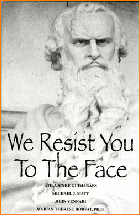

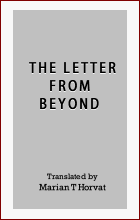
Rescuing the Cuban People or Their Dictatorship?
Highlight International
The question about this papal mediation is whether the peace pipe to be smoked between Obama and the Castro brothers, with a sui generis blend of Vatican incense and Castro snuff, will serve to rescue the Cuban people or rather their communist dictatorship.
1. On Wednesday, December 17, 2014, media around the world reported that the United States government and the Cuban regime simultaneously announced the resumption of diplomatic relations and the opening of negotiations to restore trade relations as a result of mediation by Pope Francis. The announcement was made at the same time by President Obama and Dictator Raul Castro.
2. Recalling some of this issue’s background, albeit succinctly, may help us understand how we have arrived at this juncture.
3. The Cuban people have been continuously oppressed by the Castro dictatorship in a never-ending nightmare of 56 years. When the Berlin Wall fell in 1989, and soon after the Iron Curtain collapsed, the days of the Castro dictatorship seemed numbered because it was the Soviet Union that financed the communist regime in Havana. But the Venezuelan government, first with Hugo Chavez and later with Maduro, managed to replace Soviet financing. The Castro dictatorship managed to survive and the Cuban people remained enslaved.
4. However, with the oil crisis and the political crisis, Venezuela has entered a process of disintegration. With oil prices plummeting, the Venezuelan regime is no longer able to sustain itself, let alone the Castro dictatorship. Once again, the island’s communist regime found itself in a hopeless situation: either some government with substantial finances replaced Venezuela or the days of the dictatorship would be numbered.
5. It is in this context that a new possibility to rescue the communist regime would come from the place most reviled by Castro: the American “empire.” The resumption of diplomatic and trade relations between Washington and Havana could yield rivers of “imperialist” money which the regime will undoubtedly use and abuse to continue oppressing the Cuban people.
6. Now, someone can argue that this rapprochement has the “blessing” of Francis himself. So the United States would now take over the funding of the regime with Vatican support. And along with economic livelihood the U.S. would also provide “moral” support, a type of backing which liberation theologians have always given the jailers of the island-prison.
7. It is well to recall that trips to Cuba by two previous popes, John Paul II and Benedict XVI served in one way or another to consolidate the Cuban regime, regardless of the intentions of their illustrious protagonists. John Paul II’s call for “Cuba to open itself up to the world, and for the world to open up to Cuba” has been only half-fulfilled, and in a biased fashion. Indeed, the world opened up to the Cuban regime but gave its back to the Cuban people. A tragic effect of this is the continuity of the Castro dictatorship to the present day. Every year, the United Nations General Assembly almost unanimously condemns the so-called American “embargo” of the Castro regime. The UN condemns the U.S. “embargo” but does not say a word about the very cause of the problem, which is the 56-years old “embargo” by the communist dictatorship against its own enslaved people. Nor did Benedict XVI’s trip to Cuba bring the expected fruits of liberty. “Crowded squares, crowded jails,” tweeted opposition journalist Yoani Sanchez on the occasion.
8. Now Francis’ diplomatic mediation enters the stage. The question to ask about this papal mediation is whether the peace pipe to be smoked between Obama and the Castro brothers, with a sui generis blend of Vatican incense and Castro snuff, will serve to rescue the Cuban people or rather their communist dictatorship.
9. Important Notice: These brief and informal comments by Highlight International do not necessarily represent the views of all members of its editorial board. These comments are intended to draw attention to “politically incorrect” and often ignored issues which are nevertheless vital to society. Our aim is to encourage debate and remove anesthesia. We welcome suggestions, opinions, critiques and unsubscribe requests to destaque2016@gmail.com Earlier editorials can be read on www.cubdest.org.
Highlight International. Wednesday, December 17, 2014. Director: Javier Gonzalez. Write to destaque2016@gmail.com. Thanks.
Posted by: americasalert@gmail.com